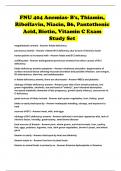FNU 404 Anemias- B's, Thiamin,
Riboflavin, Niacin, B6, Pantothenic
Acid, Biotin, Vitamin C Exam
Study Set
megaloblastic anemia - Answer folate deficiency
pernicious anemia - Answer vitamin B12 deficiency due to lack of intrinsic factor
homocysteine is increased with - Answer folate and B12 deficiency
schilling test - Answer distinguished pernicious anemia from other causes of B12
deficiency
folate deficiency anemia symptoms - Answer weakness and pallor, degeneration of
surface mucosal tissue allowing mucosal ulceration and possible infection. sore tongue,
GI disturbances, diarrhea, and malabsorption
in folate deficiency anemia, there are decreased - Answer WBCs and platelets
etiology of folate deficiency anemia - Answer poor diet of low animal products, low
green vegetables, alcoholic, tea and toast of "elderly", poor intestinal absorption,
increased metabolic demands of late pregnancy, growth (early infancy), concurrent vit.
C deficiency
good sources of folate include - Answer dark green vegetables, liver, kidney, yeast
folate is easily destroyed by - Answer inadequate handling, storage, and exposure to
heat
sources of B12 - Answer meat, milk, and eggs
etiology of B12 deficiency anemia - Answer deficient in strictest vegetarian diet, lack of
intrinsic factor, heredity, gastrectomy, small bowel disease
food sources of thiamin - Answer pork, whole grains, enriched cereals, liver, poultry,
fish, eggs, potatoes, legumes, nuts, dark green vegetables, brewer's yeast, and wheat
germ
thiamin is easily - Answer destroyed by heat and alkalinity
thiamin exists in - Answer free form in plant foods
thiamin in animal foods is primarily as - Answer thiamine diphosphate or thiamine
, pyrophosphate
thiamin must be phosphorylated in - Answer intestine
the absorption of thiamin is - Answer usually high
thiamin phosphates are digested to yield - Answer free thiamin
absorption of thiamin - Answer occurs primarily in the jejunum, secondarily in the
duodenum and ileum
what reduces thiamin absorption? - Answer alcohol
thiamin is transported by an - Answer active, sodium- dependent mechanism
thiamin is transported _______ , bound to ______________ , or as ________________
__________________ - Answer free, albumin, thiamine monophosphate
thiamin functions - Answer energy production and nutrient metabolism (coenzyme role),
synthesis of pentoses and nicotinamide adenine dinucleotide phosphate (NADPH),
nervous system functions
functions of thiamin - Answer metabolism and release of energy from carbs, oxidative
decarboxylation of a- ketoacids and 2-keto sugars, conversion of pyruvate to acetyl
CoA, reactions in the krebs cycle, anti- inflammatory, pentose phosphate pathway,
membrane conduction of nerve tissue, branched- chain amino acid metabolism
thiamin is excreted _____________ or _______________. - Answer intact, catabolized
beriberi - Answer thiamin deficiency (mental confusion, muscular problems, cardiac
disorders, CNS problems, anorexia, and fluid imbalance)
there is no tolerable upper intake level of - Answer thiamin
wernicke- korsakoff syndrome - Answer thiamin deficiency (clinical triad of confusion,
ataxia, and nystagmus)
riboflavin is important in - Answer energy metabolism
what are the 2 coenzyme forms of riboflavin? - Answer Flavin mononucleotide (FMN)
Flavin adenine dinucleotide (FAD), which are both involved in the transfer of electrons.
riboflavin is - Answer light sensitive; sunlight
dietary sources of riboflavin - Answer milk, dairy, leafy green vegetables, liver, beef,
meat, enriched cereals, and grains
riboflavin as FAD, FMN, and riboflavin phosphate are - Answer freed prior to absorption
riboflavin is absorbed by - Answer energy- dependent transporter in proximal small




